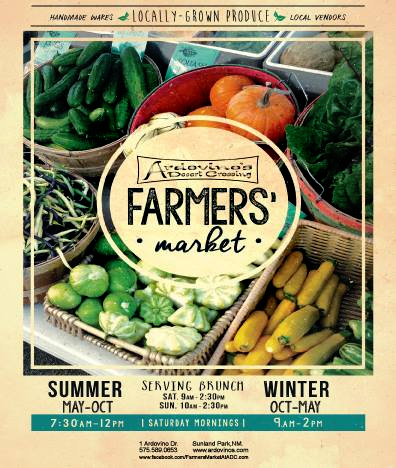
Estela Flores is an earth artist. On Saturday mornings, you can find her work, courtesy of Mother Earth, on display at Ardovino’s Desert Crossing Farmers’ Market in Sunland Park, New Mexico.
“These used to be popular in the ‘70s,” Flores said on a recent market day, as she showed off her biodome terrariums to the reporter. “It’s a real way to learn how to garden. These are easy to take care of.”
Flores’ stand offers an inspiring inventory of garden art and potted plants ready for the backyard or front porch. Visitors behold herbs, native landscape plants, organic vegetables, succulents, and a garden dragon fly fashioned from wrought iron and embodied with peat moss and soil.
Flores said the Sunland Park venue has been generous to her this year. “I actually did very, very well in the winter,” the horticulturalist said. “I actually switched to garden art and I was busy through Christmas.”
Abutting El Paso, Texas, and Ciudad Juarez, Mexico, the border market is a product showcase for creative souls and small farmers like Flores.
Flores’ good season at Ardovino’s, which extended the normal summer-fall market to the winter and early spring for the first time this year, was shared by other vendors as well.
“We’re on the tail end of the winter market, which was incredibly successful,” said Ardovino’s owner and market manager Roberto Ardovino. While the number of vendors averaged about 30 per weekend-the same as the summer months-the ratio of farmers to local food or art producers actually increased, Ardovino reported. “I think more people are doing it because there is a market for it,” he added.
The longtime restaurateur and community activist credited the growing use of greenhouses for helping to transition the 13-year-old Saturday growers’ market into a year-round venture.
In 2014, Ardovino’s welcomed the Anthony Youth Farm as the new green thumb on the seller’s aisle. Produced in cooperation with a local water district in southern Dona Ana County, New Mexico, the Anthony garden puts at-risk youth to work growing and marketing their own produce. According to Ardovino, the young people sold out their stand by 10:30 in one recent morning.
Like other farmers’ markets in the United States, Sunland Park’s edition features locally crafted jewelry and artwork, value-added food, fresh produce, eggs, and free range-grown meat. Given its unique border location at the foot of Mt. Cristo Rey, the market is splashed by the influences of Mexican culture, the Spanish language, immigration, and the Chihuahuan Desert.
Molly and Francisco Quintana are perhaps prime examples of the cultural fusion that thrives here. The couple originally lived near Albuquerque but relocated to the small southern New Mexico town of Deming 27 years ago, where they raised a family and eventually tapped into Francisco’s Mexican farming roots. Nowadays, the couple operates a small business called Eden’s Garden, which produces salad greens, asparagus, cactus, spinach, fresh eggs and, of course, chile.
A new market favorite is kale. “It’s starting to get pretty popular in the states,” Molly said.
“This is basically a family garden-just a little bit of everything,” she explained. Still, the sales at Ardovino’s justify the more than one hour drive Quintana family members undertake from their Deming-area home to Sunland Park.
For the part-time growers, Eden’s Garden helps the family income while business is slow in the couple’s main trade-selling mobile homes, Francisco chimed in.
The proprietor of Stelaflowers in neighboring El Paso, Estela Flores does bigger jobs including landscaping when she is not educating customers in Sunland Park. The key to Saturday market sales, she’s discovered, is to sell in volume while keeping prices low. “Five or six (dollars per item) or under and you are going to make money,” Flores insisted.
Regional flavors spice up the menu at the outdoor market. Staffing Tierra del Sol Farms’ stand, sales representatives Manuel Ornelas and Maria Marquez tempt shoppers with tasty samples of barbacoa, which in their recipe, consists of tender goat meat seasoned in red chile. Located southeast of El Paso in the border community of Ft. Hancock, Texas, Tierra del Sol’s specialty is goat and lamb meat raised on free range and organic standards.
The meat is USDA certified and in the process of obtaining Texas state certification, Ornelas said. Reaching into a portable cooler, the friendly man retrieved frozen chops, ground goat, goat patties, lamb and goat ribs, lamb and goat liver, and other cuts. The meat could be utilized in tacos, hamburgers, tortas, barbacoa, birria, and other dishes, Ornelas instructed.
After a one-year stint at Ardovino’s, Tierra del Sol Farms’ representatives are pleased with the reception. “The lamb and goat market is going up,” Marquez said. “We’ve had a lot of response from the public.”
Besides the weekend sales, Tierra del Sol Farms has found that Ardovino’s serves as a great publicity platform for a business in the expansion mode. For instance, shoppers can now find goat and lamb from Tierra del Sol Farms at the Food City and CNG Ranch Market (formerly Pro’s Ranch Market) supermarkets.
“We’re selling in Albuquerque, Las Cruces and El Paso, but we’re going to begin selling in Phoenix,” Ornelas said.
Additionally, the border lamb and goat producers plan to begin selling soon in the large S-Mart chain in Ciudad Juarez and Chihuahua City, he added.
For any of the producers selling at Ardovino’s, water and the environment are primary and growing issues.
Estela Flores combines her knowledge of herbs and traditional plants learned from a curandera grandmother, who was married to a general in Pancho Villa’s revolutionary army, with studies in horticulture acquired at Arizona’s Pima Community College.
Flores is big on recycling everyday products into plant containers-yogurt cups, styrofoam and even old boots. The El Paso resident said she is careful to recycle gray water at her home, and makes her own fertilizer from compost. And she insists on selecting plants that are either native to the Chihuahuan Desert or adapted to similar climatic zones across the globe.
“I sell only what will grow here,” Flores said. “These are key things. I think if you follow the rules, you will be successful.”
Ardovino is likewise very concerned about water availability and usage. He questioned the proliferation of pecan plantings in an arid region where scarce water supplies are increasingly tapped from the ground.
“All the giant straws are sucking out of the same cups,” Ardovino said. “Eventually the cups will run out.” New Mexico’s current water policy of “use it or lose it,” is a counterproductive strategy,” the market manager contended. “It should be how you use it efficiently,” he said.
Although farming has never been an easy task in the Paso del Norte border region, and many environmental indicators are worrisome, Ardovino and the crew at Sunland Park’s Saturday market effuse a dedication that fits a firm commitment to farming in the desert.
Looking ahead, Ardovino invited the public out to the border growers’ market for the Memorial Day weekend grand opening of the summer market, where music and special events are expected to accompany all the regular food and art.
“We want local food systems to expand,” he said. “We want our own local food systems to augment everything else in the world.”



Responses to “Border Farmers’ Market a Year-Round Hit”